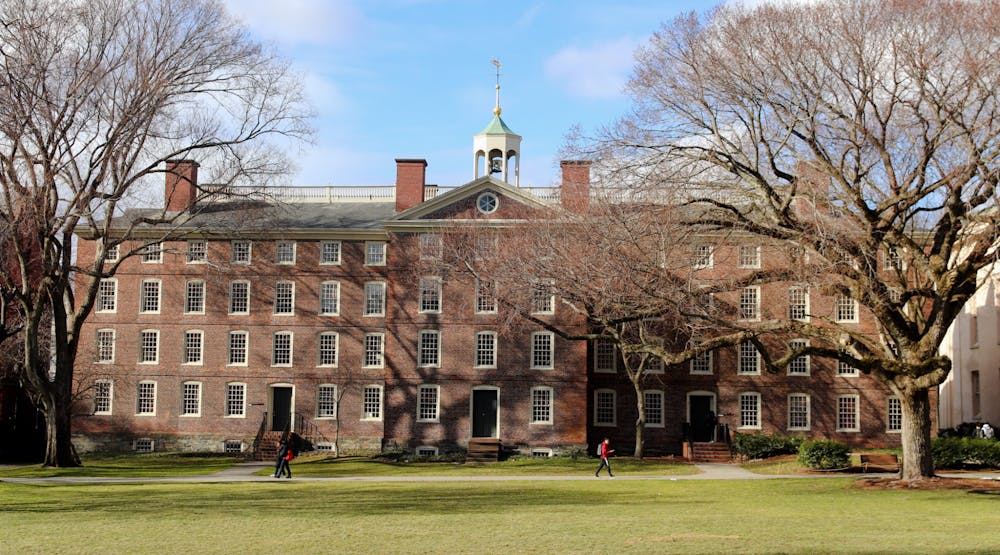In their demands during the Nov. 8 sit-in, student protestors were specific: The University should divest from corporations identified as “facilitating human rights violations in Palestine” based on a 2020 report from the Advisory Committee on Corporate Responsibility in Investment Policies.
That report is no longer being considered as of 2021 — and the University body that created it was succeeded in 2020 by a new body, the Advisory Committee on University Resources Management.
ACURM, like ACCRIP before it, is an advisory board tasked with considering the ethical standards of University investment and business practices. In this capacity, both committees have been involved in debates over divestment.
Proposed divestment from “human rights violations in Palestine”
In the decade before being succeeded by ACURM in 2020, ACCRIP addressed two statements to President Christina Paxson P ’19 P’MD’20 relating to University investments in corporations with ties to Israel and Palestine.
In a November 2012 letter following two years of “ongoing dialog with Brown Students for Justice in Palestine,” the committee wrote that “the relevant evidence suggests that Brown may be invested in firms whose products and services are being used to commit human rights violations in Palestine” and asked Paxson to “consider initiating a forum for broader exploration.”
“The University should consider the implications of its investment in companies perpetrating human rights abuses, and whether or not divestment is an option in dealing with the issue,” the committee members added.
“Fortunately, a forum for discourse already exists,” Paxson wrote in a responding letter, referring to the Brown University Community Council. In her response letter, Paxson added that while ACCRIP should consider campus voices, “this is not the only factor the committee should rely on as it considers this issue.”
In January 2020, ACCRIP published a report that included the committee’s two-thirds majority vote for divestment in response to a proposal made by the group Brown Divest.
The committee voted to recommend that the Corporation — the University’s highest governing body — and the University’s separate account investment managers exclude “companies identified as facilitating human rights violations in Palestine,” adding that investments should be withdrawn “from said companies until they cease to engage in social harm.”
Paxson responded to the divestment recommendations after ACCRIP was succeeded by ACURM in a March 2021 letter addressed to the latter body. She wrote that after a revised ACCRIP report, “the recommendation to divest still does not meet the standard as stated in the committee’s charge.”
“As I have stated on multiple occasions, Brown’s endowment should not be used as an instrument to take sides on contested geopolitical issues over which thoughtful and intelligent members of the Brown community vehemently disagree,” she continued. “We will not use the endowment to take an institutional position on this issue.”
The recommendations were never brought to the Corporation. In a recent interview with The Herald, Cass Cliatt, the University’s senior vice president for communications, said that the process surrounding ACCRIP’s recommendation has “closed” and the recommendation is not factored into current University decision-making.
ACURM’s history
ACURM was established on July 1, 2020 to replace ACCRIP, established in 1978.
At a May 2019 faculty meeting, faculty discussed a motion to replace ACCRIP with ACURM to expand the focus of the committee’s charge, which previously focused only on University investment policy, The Herald previously reported. Establishing ACURM allowed members of the Brown community to “bring pressing issues concerning core University values without being limited solely to matters of investment policy,” according to its website.
The motion received criticism from student organizations such as Brown Divest over concerns that the change would decrease student involvement, weaken the body’s independence and interfere with divestment efforts, The Herald previously reported.
Brown Divest also cited concerns over the expanded mission of ACURM, which it claimed would deliberately “dilute ACCRIP/ACURM’s focus on divestment-related issues'' by overburdening members, in a May 2019 letter addressed to the Brown community.
In May 2020 faculty voted to create ACURM, which formally came into existence on July 1, 2020.
ACURM consists of faculty members, staff representatives, student representatives and alumni representatives. All members, except for student representatives, are appointed by different bodies with advice from the President, according to the committee’s website.
ACURM’s policies
ACURM considers the “ethical and moral standards” applied to University business and investment practices, according to its website. In addition to investments, the committee also considers “issues of ethics in the acceptance of gifts and other University business practices,” such as procurement, vendor contracts and labor standards.
Members of the Brown community can submit requests for ACURM to examine “allegations of ‘social harm’ with respect to the investment or expenditure of University financial resources,” according to ACURM’s general guidelines for operations. ACURM is not required to consider all requests.
When examining requests, ACURM committee members consider many factors in addition to social harms, such as “the potential effectiveness of various means of influencing relevant policy or conduct, the University’s need to maintain a sound financial policy and the consistency of various proposed recommendations with the maintenance of an environment at Brown conducive to teaching and scholarly inquiry.”
The guidelines add that ACURM committee members should not recommend actions advancing political stances “unrelated to the investment or expenditure of University financial resources under consideration.”
In the past, the Corporation voted to divest from companies dealing in tobacco, as well as companies with business activities that supported the “Sudanese government in its continuing sponsorship of genocidal actions and human rights violations in Darfur,” based on recommendations by ACCRIP, according to the ACURM website.
Additional reporting by Sam Levine
Jennifer Shim was a University News editor at The Herald.





